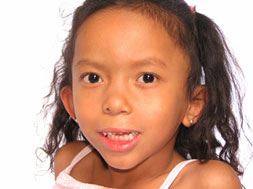
 Down syndrome is a common genetic disorder that affects one in every 700 infants, nearly 6,000 births in the US each year. Down syndrome causes mental retardation and is the most common cause of learning disabilities in children. Babies born with Down syndrome have an extra chromosome that causes delays in both mental and physical development. Down syndrome cannot be cured or prevented, but it can be detected before a child is even born. Through early treatment and medical advances, it can be a manageable condition.
Down syndrome is a common genetic disorder that affects one in every 700 infants, nearly 6,000 births in the US each year. Down syndrome causes mental retardation and is the most common cause of learning disabilities in children. Babies born with Down syndrome have an extra chromosome that causes delays in both mental and physical development. Down syndrome cannot be cured or prevented, but it can be detected before a child is even born. Through early treatment and medical advances, it can be a manageable condition.
Although there are several different types of Down syndrome, most cases are caused by trisomy 21, which involves three copies of chromosome 21, rather than the usual two copies. This is a result of abnormal cell division during development. Pregnant women over the age of 35, or those who have already given birth to a child with Down syndrome, are at a greater risk for their child being born with this condition.
Doctors screen for Down syndrome during the first few months of pregnancy through an ultrasound and blood tests. An actual diagnosis can usually be made based on the baby's appearance. Down syndrome causes symptoms that may include:
- Flattened facial features
- Upward slanting eyes
- Protruding tongue
- Small head
- Wide, short hands
- Short fingers
Aside from its defining physical symptoms, Down syndrome also causes mild to moderate mental retardation and a slow growth and development rate. Nearly half of the children born with Down syndrome also have a congenital heart defect. This condition may also increase the risk of leukemia, dementia and other problems.
People with Down syndrome often benefit from a varied team of doctors including a cardiologist, gastroenterologist, developmental pediatrician, speech and physical therapists and other specialists. Early treatment can help children with Down syndrome achieve their highest level of success.
Behavioral Consultations
Children with behavior problems often cause worry and concern among parents, who many be unsure of how to treat this situation. A behavioral consultation allows our doctor to observe your child's natural activity and interaction, as well as interview yourself, teachers or other involved adults, in order to assess behavior and develop a solution.
Consultations can be performed at any age, but are most common among school-age children. Our doctor will work together with you and your child in order to develop an individualized treatment plan that will be followed through and monitored through family encouragement and subsequent consultations.
Developmental Screening
Developmental screening is a routine diagnostic procedure used to identify any potential developmental delays. Early detection is a valuable tool in treating nearly every condition, in order to end the problem before it spreads and prevent future damage. Developmental screenings can identify delays that can indicate autism, mental retardation and attention deficit/hyperactivity disorder, among others.
Screenings can be performed through simple questioning during a regular checkup to ensure that your child is progressing at a rate that is considered normal.This takes only a few minutes at each doctor's visit, but can play a major role in identifying and then treating early developmental conditions.
Cleft Lip and Palate
A cleft lip and palate is the most common birth defect of the face that involves a split in the upper lip and/or gap in the roof of the mouth. Over 6,000 infants are born in the US each year with this condition, which is caused by abnormal development of the lip and palate. A cleft lip and palate can cause feeding, speech, ear and dental problems.
A cleft can appear in the lip or palate alone, or in both areas and on one or both sides of the mouth. Children with clefts are at higher risk for ear infections and dental problems. Feeding is usually difficult as well.
 Reconstructive surgery is the recommended treatment for clefts. This surgery is usually performed when the child is 3 to 6 months for a cleft lip and 9 to 14 months for a cleft palate. It is recommended for your child to regularly meet with different specialists in order to help develop the areas that may be affected by the clefts. Although this condition requires a lot of care, it is manageable and can be overcome by many children with the help of a trusted team of doctors.
Reconstructive surgery is the recommended treatment for clefts. This surgery is usually performed when the child is 3 to 6 months for a cleft lip and 9 to 14 months for a cleft palate. It is recommended for your child to regularly meet with different specialists in order to help develop the areas that may be affected by the clefts. Although this condition requires a lot of care, it is manageable and can be overcome by many children with the help of a trusted team of doctors.


